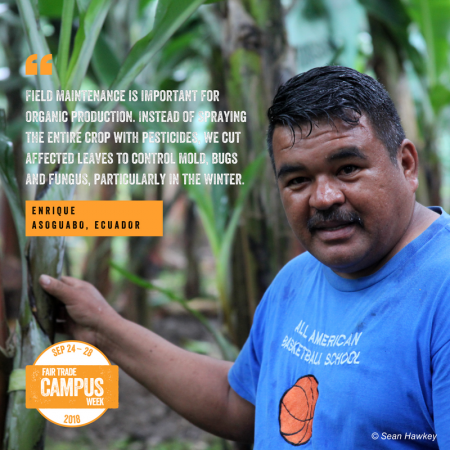What makes something fair trade?

Fair Trade Campus Week 2018 is taking place September 24-28. Universities all across Canada are holding events to educate and excite students about the impact of fair trade products. Check out Carleton’s Fair Trade Campus Week schedule here.
The term “fair trade” is often used to describe a good that was produced in a manner that is less exploitative than conventional practices. However, without reputable certification methods, it can be difficult to verify if the “fair trade” business model had any impact. Labeling is an important feature of fair trade operations. The certification labels associated with a “fair trade” product dictate the integrity of the business practices behind the product’s creation.
Carleton University is a Fairtrade Certified Campus. This certification is bestowed to campuses that have committed to support and educate about fair trade. As a Fairtrade Certified Campus, Carleton works hard to make as many Fairtrade products available as possible. The Fairtrade logo can be found on around campus where Fairtrade products are sold, indicating the product was created using Fairtrade standards.
Fairtrade Canada, which follows the same guidelines as Fairtrade International, has a rigorous series of social, economic, and environmental standards. These standards are curated for specific product industries and geographic regions. There are four major features to Fairtrade standards:
- Minimum Price
The price of goods, especially raw materials, can fluctuate rapidly on the global market. A drought or extra rainy growing season can dramatically affect a product’s supply, and consequently its price. The Fairtrade Minimum Price is a form of protection for farmers against volatile prices. The Minimum Price is a price the farmer will at the very minimum be paid for their goods, regardless of how much lower the market price may be. If the market price is higher than the Fairtrade Minimum Price, farmers receive the market price. This protection ensures farmers have a secure and stable income, allowing them to plan for their future.

- Worker Rights
Fairtrade operations are at least 50% owned by the producers through some form of co-operative. Each farmer has an equal voice, allowing them to be involved in the decision-making process. This means farmers have the power to influence the use of resources and the setting of prices.
- Sustainable Practices
The Minimum Price is set at a level which provides farmers with the funds to operate in an ecologically and socially sustainable manner. Labour standards requiring safe and equitable work environments are strictly enforced. Environmental standards promoting sustainable management of natural resources are central to Fairtrade to ensure future generations can utilize the same resources with similar capacity.
- Fairtrade Premium
One of the most unique components of Fairtrade business agreements is the Fairtrade Premium. Farmer co-operatives are paid a sum of money known as a Fairtrade Premium that goes into a communal fund. This fund can be used as members of the co-operative see fit. The Fairtrade premium funds may be reinvested into the product’s operations, such as a new irrigation system. Members of the co-operative may also decide to invest the Fairtrade premium funds into their community, such as building a new school or medical center.
We are excited to celebrate Fair Trade Campus Week with the Carleton community. Creating a culture of understanding about the power of purchasing sets Carleton up to be a truly sustainable university. If you’re interested in learning more about fair trade or want to become involved in advancing the use of fair trade certifications, check out the Fair Trade Campus Group. Be sure to look for the Fairtrade Certified logo when shopping on and off campus!
